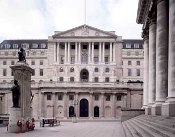The Bank of England (BofE) has cut its base rate to 5 per cent, representing the first drop in interest rates since the onset of the Covid-19 pandemic in March 2020.
Interest rates had been held at 5.25 per cent at seven successive meetings between the Bank’s Monetary Policy Committee (MPC), since they were first increased to that level in August last year.
At the latest meeting, the MPC voted by a narrow majority of five to four to reduce the base rate by 0.25 percentage points, to 5 per cent. Four members were in favour of maintaining the bank rate at 5.25 per cent.
Commenting on the shift, BofE Governor, Andrew Bailey, said that inflationary pressures have “eased enough that we’ve been able to cut interest rates”.
“We need to make sure inflation stays low, and be careful not to cut interest rates too quickly or by too much,” he added in a statement. “Ensuring low and stable inflation is the best thing we can do to support economic growth and the prosperity of the country.”
Standard Life managing director for retail direct, Dean Butler, described the news as a "big moment", highlighting the cut as a "milestone as the UK emerges from a prolonged cost-of-living crisis".
"Savers are likely to be less pleased," he clarified however, noting that while there are some cash savings deals still hovering around 5 per cent, "these are likely to fall off as banks react to today’s news and price in potential further rate drops later this year".
XPS Pensions Group, however, suggested that the cut will come as particularly good news for pensioners, who have suffered "substantial losses" in the real value of their pension income as a result of the spike inflation observed post Covid, where their benefits have fixed increases or are inflation linked but with a cap.
The group also pointed out that the BofE's decision has come at a time when many defined benefit (DB) pension schemes are experiencing "extremely positive funding levels".
Indeed, XPS Pensions Group's tracker showed that the aggregate surplus of UK pension schemes on long-term targets stood at approximately £186bn at the end of July, down from £194bn the previous month.
Based on assets of £1,469bn and liabilities of £1,283bn, XPS found that the aggregate funding level of UK pension schemes on a long-term target basis stood at 114 per cent of the long-term value of liabilities as of 30 July 2024.
However, XPS senior consultant, Henry Shore, pointed out that, the last time the BofE cut the base rate, at the start of the Covid-19 pandemic in March 2020, interest rates were cut to just 0.1 per cent, compared with 5 per cent today, and DB pension schemes faced combined estimated long-term target deficits in excess of £300bn.
"Whilst the significant improvements in funding levels have been great news for members, trustees and sponsors alike, it also highlights how quickly circumstances can change due to unexpected market movements," he continued.
"With The Pensions Regulator’s new DB funding code finally being laid in parliament on Monday 29 July, now is an opportune moment for trustees and sponsors of pension schemes to assess their long-term planning and risk management strategies as they look to protect their positive funding positions and reach their long-term targets.”
Adding to this, Hymans Robertson head of capital markets, Chris Arcari, warned that the pace of rate cuts from here is likely to be very gradual given the current decent growth backdrop and stickiness in underlying measures of inflation.
“While headline inflation has been at the BoE’s 2 per cent target in May and June, energy prices mean it is likely to rise in the second half of the year and is forecast to reach close to 3 per cent by the end of 2024," he continued.
"Furthermore, recent data on GDP growth, services inflation, and wage growth have all exceeded the Bank of England’s forecasts recently, which, all else equal, weighs against the BoE cutting rates."
This was echoed by Cardano senior multi-asset strategist, Ross Barr, who suggested that the overall outlook for the UK economy is "modest".
"We continue to expect to see only a shallow recovery to continue through this year and into 2025," Barr stated.
"Market consensus has moved towards our long-standing cautious view. The onus may well fall upon monetary policy to support the UK economy as recovery progresses into next year."
Latest News
-
OBR analysis reveals potential impact of salary sacrifice changes
-
Strong funding levels continue as endgame landscape reshaped by innovation
-
Harwich Haven Authority Pension Fund finalises £45m buy-in with Royal London
-
GAD publishes LGPS gender pension gap reporting guidance
-
DB scheme funding levels continue to improve heading into 2026
-
News in brief - 6 February 2026
Private markets – a growing presence within UK DC
Laura Blows discusses the role of private market investment within DC schemes with Aviva Director of Investments, Maiyuresh Rajah
The DB pension landscape
Pensions Age speaks to BlackRock managing director and head of its DB relationship management team, Andrew Reid, about the DB pensions landscape
Podcast: From pension pot to flexible income for life

Podcast: Who matters most in pensions?

In the latest Pensions Age podcast, Francesca Fabrizi speaks to Capita Pension Solutions global practice leader & chief revenue officer, Stuart Heatley, about who matters most in pensions and how to best meet their needs
© 2019 Perspective Publishing Privacy & Cookies











Recent Stories